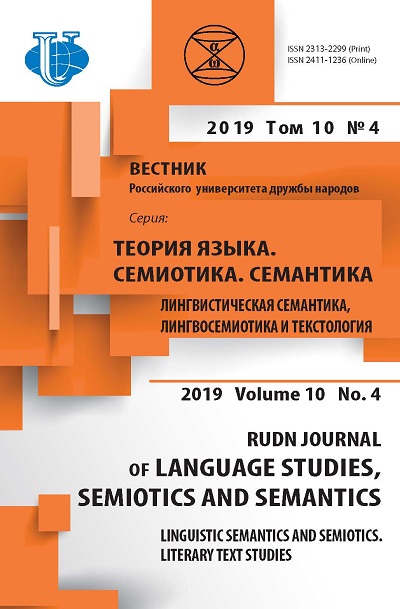Semantic Transformation of Film Titles, Translated to Russian
- Authors: Aleksandrova O.I.1
-
Affiliations:
- Peoples’ Friendship University of Russia (RUDN University)
- Issue: Vol 10, No 4 (2019): Linguistic Semantics and Semiotics. Literary Text Studies
- Pages: 810-827
- Section: FUNCTIONAL SEMANTICS
- URL: https://journals.rudn.ru/semiotics-semantics/article/view/22769
- DOI: https://doi.org/10.22363/2313-2299-2019-10-4-810-827
- ID: 22769
Cite item
Full Text
Abstract
The article focuses on the issue of semantic transformations that occur when translating the titles of feature films using partial and complete replacement strategies. The research material includes 104 film titles, 31% of the total number of English-language films released in Russia in 2018. The paper attempts to highlight the semantic center in the film titles and classify them according to the type of the center. The analysis of the semantic structure of film titles in the original and translated versions made it possible to identify six groups with the semantic center of “character (s)”, “numbers”, “objects”, “chronotope”, “storyline”, “idea”. In 39% of the names, a shift in the semantic center with partial or complete replacement is observed. The name as a verbal component of a complex unit - filmtext is involved in the formation of the first impression of a potential audience. Film titles transformations can entail a shift in the focus of the addressee and affect his perception of film text as a whole. The study reveals a general tendency of transferring from abstract to concrete and from personal to event when translating the film titles from English to Russian.
About the authors
Oksana I. Aleksandrova
Peoples’ Friendship University of Russia (RUDN University)
Author for correspondence.
Email: alexandrova-oi@rudn.ru
PhD of Philology, Associate Professor, Associate Professor of the General and Russian Linguistics Department; RUDN University
6, Miklukho-Maklaya street, Moscow, 117198, Russian FederationReferences
- Podymova, Yu.N. (2006). Films Titles In The Structural-Semantic And Functional-Pragmatic Aspects [dissertation]. Maykop. (In Russ.).
- Milevich, I.G. (2007). Strategies For Translating Movie Titles. Russian Language Abroad, 5, 65—71. (In Russ.).
- Balzhinimaeva, E.Zh. (2009). Movie Title Translation Strategies. Ulan-Ude. URL: https://www.labatr.bsu.ru (accessed: 25.05.2019). (In Russ.).
- Aleksandrova, O.I. & Nikolaeva, U.A. (2016). Traslation Strategies Of Modern English Filmonyms Into Russian And Spanish (The Example of Films Released in 2008—2014), RUDN Journal of Language Studies, Semiotics and Semantics, 7(2), 113—122. (In Russ.).
- Wildfeuer, J. (2012). More Than Words. Semantic Continuity In Moving Images, Image & Narrative, 13(4), 181—203.
- Veleva-Borissova, A. (1993). La théorie interprétative de la traduction et les titres [dissertation]. Paris: ESIT. (In French).
- Skvortsova, E.V. (2011). Pragmalinguistic Potential of Miniformat Texts Name of American Movies, Scientific bulletin of Belgorod State University. Humanities Sciences, 6 (101), 203—208. (In Russ.).
- Kolodina, E.A. & Pashkova, I.V. (2016). The Specificity Of The Image-Sense In Translating Film Titles (based on the English and Korean Languages), Siberian Journal of Philology, 2, 188—195. doi: 10.17223/18137083/55/20. (In Russ.).
- Rufova, E.S. (2017). Semantic Interpretation Of Filmonyms (by the Material of the Japanese Language), Philological Sciences. Questions of theory and practice, 6 (72), Part 1, 127—129. (In Russ.).
- Tkacheva, A.N. (2019). Features of the Russian Localization of French Film Titles, Philological Sciences. Questions of theory and practice, 2. (In Russ.).
- Anisimov, V.E., Borisova, A.S. & Conson, G.R. (2019). Linguocultural Localization of Movie Titles, Russian Journal of Linguistics, 23(2), 435—459. (In Russ.).
- Panova, K.O. & Bondarenko, E.V. (2013). Factors complicating the translation of film titles, Intellectual potential of the XXI century: Steps of knowledge, 16, 73—78. (In Russ.).
- Vorontsova, I.I. & Tkachenko, N.L. (2015). Trends in Translating Movie Titles in the Context of Modern Russian Cinema Market, New Philological Bulletin, 3 (34), 139—149. (In Russ.).
- Bocharnikova, N.V. (2013). The Genre Identification of a Translated Text as a Means of Linguistic Marketing, World of Science, Culture, Education, 1 (38), 191—194. (In Russ.).
- Knysh, E.V. (1988). The Name of Films as an Object of Onomastics In Actual Problems of Russian Onomastics. Kiev. pp. 106—111. (In Russ.).
- Vasilieva, T.V. (2006). Cognitive Mechanisms of the Formation and Functioning of the Title, Moscow State University Bulletin. Ser. 19. Linguistics and intercultural communication, 1, 154—171. (In Russ.).
- Gorshkova, V.E. (2014). Film Title as a Unit Of Translation and a Unit Of Image-Sense, Bulletin of the Perm National Research Polytechnic University. Problems of linguistics and pedagogy, 10, 33—34. (In Russ.).
- Alexandrova, O.I. (2017). Original and Translated Film Titles as Specific Naming Units, RUDN Journal of Language Studies, Semiotics and Semantics, 9(4), 1176—1185. (In Russ.).
- Akchurina, N.I. & Mubarakshina, A.M. (2018). Nomination of Art Films in the Aspect of Linguoculturology, Kazan Linguistic Journal, 1(4—4), 52—60. (In Russ.).
- Veselova, N.A. (1998). Title of Literary Text: Ontology and Poetics [dissertation]. Tver. (In Russ.).
- Lamzina, A.V. (1999). Title In Introduction to Literary Criticism. Moscow: Vysshaja shkola. (In Russ.).
- Babenko, L.G., Vasiliev, I.E. & Kazarin, Yu.V. (2000). Linguistic Analysis of Literary Text. Yekaterinburg: Publishing House of the Ural Institute. (In Russ.).
- Kelz, H.P. (2000). Interkulturelle Kommunikation und Wirtschaftsdeutsch-Didaktik. Das Wort. Germanistisches Jahrbuch '00-01 GUS. Moscow: Metatext, Ltd. (In German).
- Potapova, R.K. (2009). Comparative Paraverbal and its Prosodic Correlates, Contrastive studies of the languages of the world: Readings from the memory of V.N. Yartseva, 3, 252—258. (In Russ.).
Supplementary files












